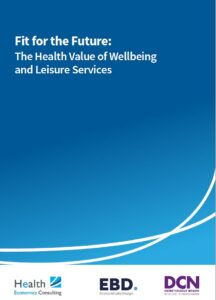Fit for the Future: The Health Value of Wellbeing and Leisure Services
This new report from DCN, produced with health consultants HEC at University of East Anglia and Economics By Design, delivers strong evidence of the potential of these services to tackle health inequalities and level up our communities.
The report shows that engagement of just over 1 million of the inactive population of England in a prescribed leisure services programme could provide the following impacts over a 10-year period:
- Almost 45,000 diseases avoided
- A direct saving to the NHS of £314 million for the cost of treatment of those diseases
- 70,000 Quality-Adjusted Life Years (QALY) gained (a year of life in perfect health is equal to one QALY)
- This QALY gain has a health value of £1 billion and economic value of £4.2 billion
- A 3.7 year reduction in the healthy life expectancy gap
DCN is now calling for health and council partners to work together to create and extend social prescription pathways and fully integrate council leisure and wellbeing services into health systems. The inactive population of just over 1 million in the report model represents referral of 154 patients from each GP surgery across England
We have produced a supplementary policy paper to accompany this report which lays out recommendations for:
- The Office for Health Improvement and Disparities (OHID) to spearhead a new nationwide approach to the role of the leisure and wellbeing sector in tackling health inequalities; investing now in these services to avert bigger costs in health and care further down the line.
- Healthcare services to work with further with local councils as Integrated Care Systems develop, to enhance and maintain prescription pathways to our services
It also details:
- DCN member councils’ critical influence on wider public health through a range of services
- Case studies from across our membership demonstrating how our members imbed these services into their communities and effectively engage inactive people.
You can access this supplementary document here







